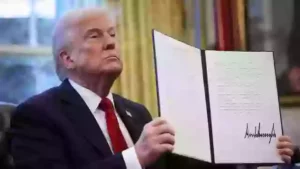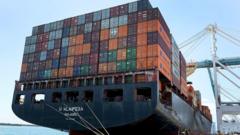President Donald Trump, alongside Israeli Prime Minister Benjamin Netanyahu, hailed the launch of a new reciprocal tariff policy aimed at leveling the global trade playing field. This strategy, framed as "Liberation Day," demands equivalent tariffs from countries, sparking significant international negotiations and debate over its potential impact on economic relations.
Trump's Tariff Policy Sparks Global Trade Revolution

Trump's Tariff Policy Sparks Global Trade Revolution
As President Trump announces his reciprocal tariff plans, countries worldwide rush to renegotiate trade agreements ahead of the change.
Article text:
In a groundbreaking announcement on Monday, President Donald Trump stood with Israeli Prime Minister Benjamin Netanyahu to unveil a new reciprocal tariff policy that he believes will reshape global trade. Trump proclaimed that “virtually every country wants to negotiate” in anticipation of the policy’s implementation scheduled for Wednesday.
Describing the occasion as “Liberation Day,” Trump emphasized this initiative as a vital shift towards reclaiming America's trade independence after years of perceived economic imbalances. The new measures will entail imposing matching tariffs on nations that have historically enjoyed lower import fees while imposing high tariffs on American products.
“No more free ride,” he declared to reporters, making it clear that reciprocal measures would be the norm. He provided a clear example: if foreign countries impose a 25% tariff on U.S. cars, the U.S. will do the same. Trump emphasized that this long-awaited change has already begun yielding results, with global leaders queuing up to renegotiate terms amid concerns about losing access to the lucrative U.S. market under a tougher trading climate.
The ripple effects of Trump's announcement have been felt across the global economy, leading both allies and adversaries to reassess their trading strategies. The President insists that this policy is not a step toward isolationism but rather a move towards equitable engagement in trade, asserting that the U.S. would no longer be "the world’s piggy bank."
Countries like China, Germany, and some NATO allies will feel significant pressure as they attempt to navigate the new landscape with matching tariffs. Trump noted that diplomatic discussions are already underway, with many international leaders hinting at a readiness to reduce barriers to maintain favorable relations with the United States.
Supporters herald the policy as a necessary correction to decades of globalization, while detractors express concern about possible retaliation and increased costs. However, Trump remains firm in his conviction: “We’re not starting a trade war—we’re concluding one that was quietly eroding American jobs.”
In a groundbreaking announcement on Monday, President Donald Trump stood with Israeli Prime Minister Benjamin Netanyahu to unveil a new reciprocal tariff policy that he believes will reshape global trade. Trump proclaimed that “virtually every country wants to negotiate” in anticipation of the policy’s implementation scheduled for Wednesday.
Describing the occasion as “Liberation Day,” Trump emphasized this initiative as a vital shift towards reclaiming America's trade independence after years of perceived economic imbalances. The new measures will entail imposing matching tariffs on nations that have historically enjoyed lower import fees while imposing high tariffs on American products.
“No more free ride,” he declared to reporters, making it clear that reciprocal measures would be the norm. He provided a clear example: if foreign countries impose a 25% tariff on U.S. cars, the U.S. will do the same. Trump emphasized that this long-awaited change has already begun yielding results, with global leaders queuing up to renegotiate terms amid concerns about losing access to the lucrative U.S. market under a tougher trading climate.
The ripple effects of Trump's announcement have been felt across the global economy, leading both allies and adversaries to reassess their trading strategies. The President insists that this policy is not a step toward isolationism but rather a move towards equitable engagement in trade, asserting that the U.S. would no longer be "the world’s piggy bank."
Countries like China, Germany, and some NATO allies will feel significant pressure as they attempt to navigate the new landscape with matching tariffs. Trump noted that diplomatic discussions are already underway, with many international leaders hinting at a readiness to reduce barriers to maintain favorable relations with the United States.
Supporters herald the policy as a necessary correction to decades of globalization, while detractors express concern about possible retaliation and increased costs. However, Trump remains firm in his conviction: “We’re not starting a trade war—we’re concluding one that was quietly eroding American jobs.”






















